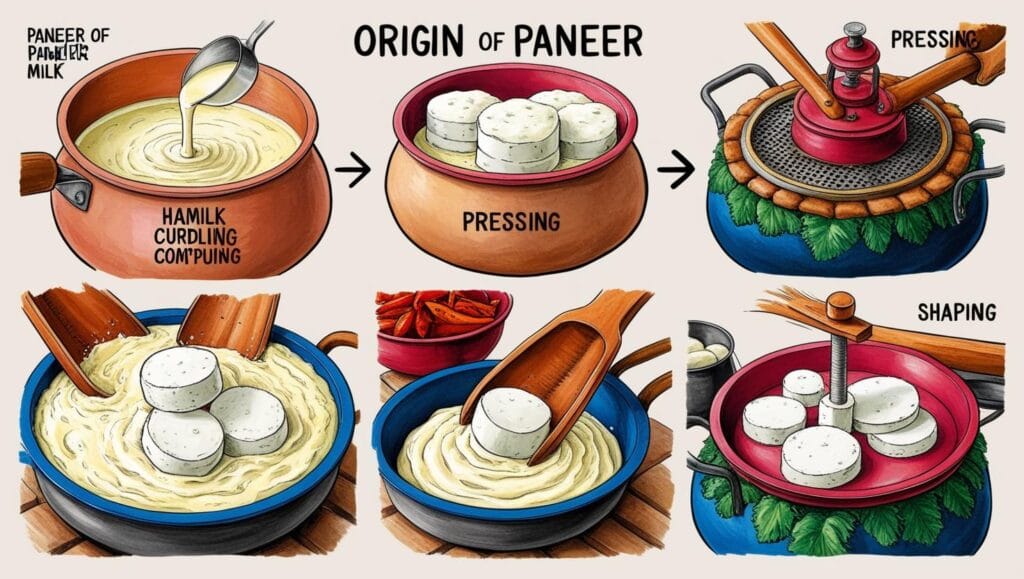
The Fascinating History of Paneer
Paneer, a beloved dairy product in South Asian cuisine, has a rich and intriguing history. It is a fresh cheese made by curdling milk with an acid such as lemon juice or vinegar. Paneer does not require fermentation or rennet, unlike aged cheeses, making it an excellent vegetarian-friendly protein source.
The origins of paneer are widely debated, with some historical records tracing it back to the Indus Valley Civilization (circa 3000 BCE – 1500 BCE). However, a more widely accepted theory suggests that the technique of curdling milk to make paneer was introduced to India by Persian and Afghan invaders around the 16th century. The word “paneer” itself is derived from the Persian word “panir,” which refers to cheese.
In traditional Indian cuisine, paneer became a staple ingredient, especially in North India, Bengal, and parts of Pakistan and Bangladesh. It is commonly used in curries, snacks, and desserts, playing a crucial role in vegetarian diets.
Health Benefits of Paneer
Paneer is not just a flavorful and versatile ingredient; it is also packed with essential nutrients that contribute to overall well-being. Here are some of the key health benefits of paneer:
1. High in Protein
Paneer is an excellent source of protein, making it an ideal food for vegetarians. A 100-gram serving of paneer contains approximately 18 grams of protein, which helps in muscle growth and repair. It is a great option for athletes, bodybuilders, and those looking to increase their protein intake.
2. Rich in Calcium for Strong Bones
Calcium is crucial for bone health, and paneer is loaded with it. Regular consumption of paneer helps prevent osteoporosis and strengthens bones and teeth. It is especially beneficial for growing children and older adults who require additional calcium support.
3. Aids in Weight Management
Paneer is low in carbohydrates and high in protein and healthy fats, which helps keep you full for longer periods. It promotes satiety and reduces overall calorie intake, making it an excellent food choice for those on a weight-loss diet.
4. Good for Heart Health
Paneer contains omega-3 fatty acids and monounsaturated fats, which are beneficial for heart health. It helps in maintaining good cholesterol levels (HDL) and reducing bad cholesterol (LDL), thereby lowering the risk of heart disease.
5. Improves Digestion
Paneer is a rich source of casein protein, which is easy to digest. Additionally, it contains probiotics that support gut health by promoting the growth of beneficial bacteria in the digestive system.
6. Helps Control Blood Sugar Levels
Paneer has a low glycemic index, meaning it does not cause sudden spikes in blood sugar levels. It is a great addition to the diet of individuals with diabetes, as it helps maintain steady glucose levels.
7. Boosts Immunity
Paneer is rich in essential nutrients like vitamin D, B-complex vitamins, and zinc, all of which play a role in strengthening the immune system. Regular consumption can help the body fight infections and diseases more effectively.
8. Supports Brain Function
The presence of omega-3 and omega-6 fatty acids in paneer contributes to cognitive health. These nutrients are essential for brain function, memory retention, and reducing the risk of neurodegenerative diseases like Alzheimer’s.
Conclusion
Paneer is a nutritious and delicious addition to any diet. Whether you enjoy it in a rich curry, grilled, or as a salad topping, it provides numerous health benefits while adding depth to your meals. As a protein-packed, calcium-rich, and heart-friendly food, paneer is a staple that deserves a spot in your regular diet.
For more delicious paneer recipes and health tips, explore Satyalogam and elevate your culinary experience!
Follow me on twitter
Feel free to share your thoughts with me
